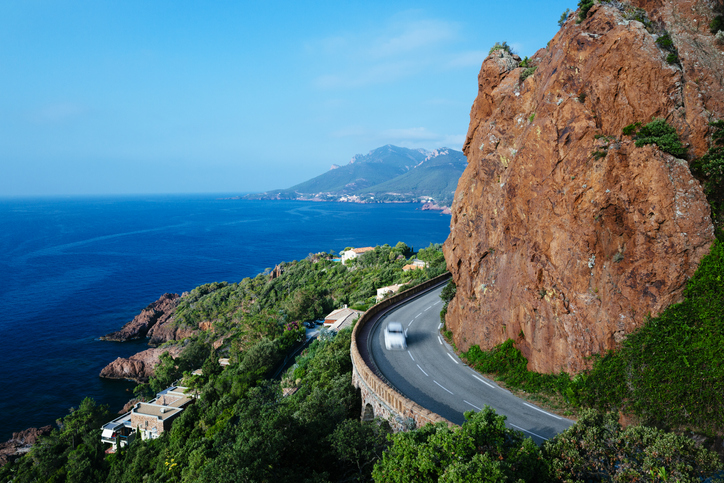Driving in France: The complete guide
The French were one of the very first to adopt motoring, and to this day, France remains one of the world’s best countries in which to drive – there are so many beautiful and diverse landscapes through which to cruise, from the hills of Occitania, to the wild Atlantic coast.

If you’re planning on spending a substantial amount of time in France, and particularly if you’re going to call it home for extended periods of time, there’s a few things that The Local and Fab French Insurance think you’ll need to know before getting on the road.
Licence and registration, s'il vous plaît!
If you’re a licensed driver, there will be a period of time upon arrival in France during which you can legally drive using your current licence.
For UK drivers, if your licence was issued before the 1st of January 2021, it’s valid until the expiry date shown on the licence. Licences issued after that date are valid for one year from the date shown on your residency permit, or Carte de séjour.
If your licence was issued in the EEA, it’s valid until the expiry date shown. If your licence was issued outside of the EEA – such as in the United States – your licence is also valid for one year from the date shown on your residency permit, provided you have an authorised French translation (with an apostille, if completed abroad), or an International Driving Permit.
After your licence expires, you’ll need to exchange it for a French driver’s licence. You'll also need to exchange your foreign licence if you receive a points deduction for a driving offence in France or you want to add a different class to your licence (for example, to ride a motorcycle). Depending on where you are, this will need to be done at the local Mairie (town hall) or Préfecture de Police (regional police authority).
If your home country does not have a reciprocal agreement with France, you’ll need to apply for a French driver’s licence, much as French citizens do. This can be initiated through your Prefecture, or a local driving school. You can check to see whether your home country has a reciprocal agreement here.
If you’re planning to live in France on a long-stay visa, your car will also need to be registered – within a maximum of three months of arrival – or you'll risk a fine. This can be quite a complex process, with a number of documents and an understanding of the system required to obtain what is known as the Carte grise. This is one area where the specialists at Fab can assist in streamlining the process.
On the same subject, it's important to note that you need to be a permanent resident to legally own a car in France. If you don't have an EEA passport, or a pre-Brexit UK passport, it's worth your time speaking to experts to see how you can navigate this requirement.
As part of the registration process, you'll also need to make sure that your car is up to date on its Controle Technique – roughly equivalent to the British MOT, or regular vehicle inspection. The first needs to be conducted roughly two months before the four year anniversary of the purchase of a new vehicle, and every two years thereafter.
On the road
Once you’re legally licensed, and your car is registered to drive on France’s wonderful roads, there are a few things you’ll need to keep in mind.
Before you turn the key, you’ll need to make sure that you have a yellow hi-vis vest and warning triangle to be used in case of breakdown.
Once underway, know that speed limits on many roads outside of towns have been reduced to 80 km/h, in an effort to lessen accidents.
For those who enjoy a little music, that’s fine. However, while driving, headphones or headsets are strictly forbidden.
While everyone loves a country drive and some wine tasting, it’s also important to know that the legal blood alcohol limit is 0.2g for those with less than three years’ driving experience, and 0.5g for everyone else. This is rigorously enforced.
If your car is slightly older, you’ll need to check before driving in Paris – it’s what is known as a Low Emission Zone, meaning that some vehicles cannot be driven inside the city between certain times.
Some cities are also what are known as ‘Clean Air Zones’, and require a sticker that can be purchased online, after providing a few details about your car. It’s important to check ahead, as depending on pollution levels, this particular requirement may be eased for specific cities.
Read more about what to do if you break down in France, thanks to Fab
Safe and sound
It is a legal requirement to insure your vehicle in France – at the very least, it must have third-party insurance. You can be fined over €3,000 if you’re caught without it.
While your insurance from abroad may be valid for a certain period of time upon your arrival, once you’ve registered your vehicle in France, you’ll need to arrange cover with a French insurer.
There may be a gap period where your foreign insurer is no longer willing to cover your vehicle and the importation process is not yet complete. Some insurers, such as Fab, can insure your car with foreign plates waiting for the import process to be completed which will save them tons of time, hassle and money.
If you want greater protection, insurers also offer additional levels of coverage, including fire and theft, and fully comprehensive insurance. Note that roadside assistance and breakdown cover are always part of your French car insurance policy. Unlike other countries they cannot be bought separately.
Another thing to keep in mind is that French insurers require a lot of documentation regarding your insurance history, more so than in many other countries. This is necessary, for example in applying a 'no claims bonus'. Again, this is a complex process, and without professional help you can easily find yourself with a bad deal, or in a situation where the costs of a claim skyrocket.
That said, the market for vehicle insurance in France is a crowded one, featuring many providers with many different offerings. However, very few of these insurers understand the subtleties that come with being an expat and even fewer will speak English so working with a broker that 'knows the drill' – such as Fab – will save you time, money and troubles.
This content was paid for by an advertiser and produced by The Local's Creative Studio.


Join the conversation in our comments section below. Share your own views and experience and if you have a question or suggestion for our journalists then email us at [email protected].
Please keep comments civil, constructive and on topic – and make sure to read our terms of use before getting involved.
Please log in here to leave a comment.